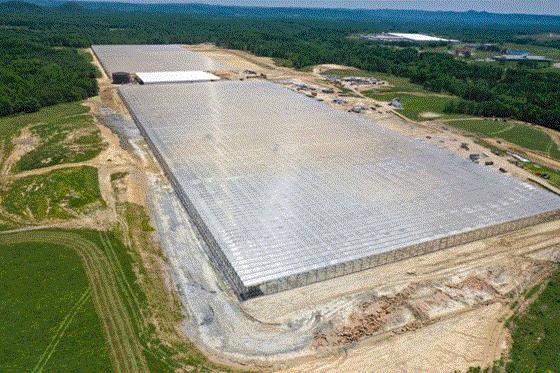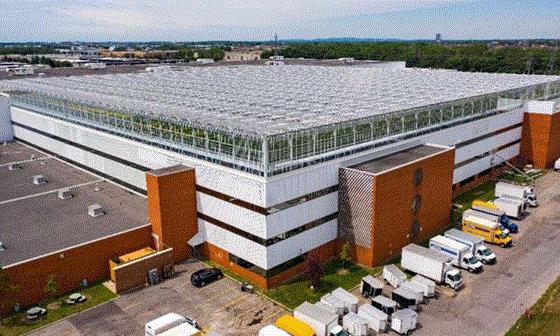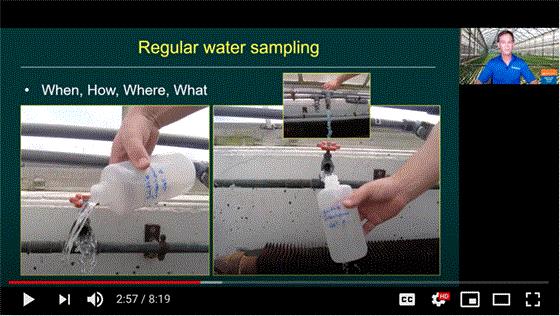Grimes to close
The news about Grimes Horticulture of Concord, Ohio, came in an email to a few suppliers from co-owner Gary Grimes, who wrote the following:
After 95 years in business, Grimes Horticulture is shutting down. Grimes managed the timing of this carefully and have paid over 95% of our obligations to vendors.
We are extremely proud of our exceptional employees, who have been as dedicated and productive as any company could possibly ask for.
Owners Gary Grimes and Rod LeDrew will assist our employees to help seek new positions of employment. Grimes will see that plant orders, already placed for the current season, will be fulfilled. We will also follow up to assist with seed orders that have been placed with us. Questions should be directed to Bill Steen.
We could not be more appreciative of our wonderful, valued customers, who will be intensely missed. It has been an honor to get to know and work with so many of you in this wonderful industry.
What the announcement didn’t say was why? Why suddenly close a 95-year-old business. Why not at least try to sell it?
The answer came in an email from Gary to me after I dropped him a line, inquiring as to the rest of the story. I was shocked to read his answer.
“Our closing is the result of an embezzlement, which was too large for the company to financially digest,” wrote Gary, adding, “I don’t want to discuss who the embezzler is or the amount.”
He continued, “Bill Steen, our president, has accepted another position in the industry, as have some of our employees.” (I've since learned that Bill’s new position is at Fleurizon International, where’s he’s general manager.)
Gary didn’t say anything more than that, and a Google search didn’t turn up any details of the crime, so there's nothing else I can share at this point.
For background, Gary came to Grimes by purchasing it. Actually, he purchased H.G. German Seeds in 1984 and renamed the company. H.G. German was founded in 1926. That would make Grimes technically 94 years old, not the 95 that Gary referenced, but then I learned that Grimes is a DBA (“doing business as”) and the real company name is Gardenlife Inc., which Google says is in the business of “wholesale distribution of animal feeds, fertilizers, agricultural chemicals and other farm supplies.” Gardenlife was founded in 1925—which WAS 95 years ago. So we at least got to the bottom of that particular story.

Can a tomato greenhouse be worth $1 billion?
We may find out because Kentucky hydroponic vegetable startup AppHarvest could be valued at that or even more if a planned merger goes through. AppHarvest is merging with Novus Capital, a so-called “special purpose acquisition company” (SPAC) that’s already listed on the NASDAQ (NOVS). Novus will change the company name to AppHarvest, which will remain listed on the NASDAQ under a new ticker symbol. It’s expect the company will be valued at $1 billion (based on a price of $10 per share), with $475 million of that available to make use of. The deal should close in Q4 2020 or Q1 2021.
AppHarvest, you may recall from reading about it here (or seeing it on “60 Minutes”), is a Kentucky-based hydroponic vegetable greenhouse startup that made headlines for being backed by AOL co-founder Steve Case and "Hillbilly Elegy" author J.D. Vance, among others. Founder Jonathan Webb, a Kentucky native, touts his home state as a good location because it’s within a day’s drive of 70% of the U.S. population and it’s a region of the country in need of industry and jobs. His idea for a modern agricultural business has since attracted even bigger names to his Board, including Martha Stewart and Impossible Foods CFO David Lee. The concept has also sparked the imagination (and greed) of investors, with investment funding now reaching about $150 million.
And this is without growing their first tomato.
Granted, AppHarvest is constructing a 60-acre Dalsem greenhouse in Morehead, Kentucky (which some journalists are calling the largest in the world; it’s not). But they have not yet grown or sold a single tomato. The interest from the press and investors is all based on the dream of abundant local produce grown with 90% less water and no pesticides—you know, the usual utopian agriculture dreams being touted by every vertical farm and urban ag startups.

But to value an untested greenhouse business at $1 billion? I suspect the idea makes those already operating in the space chuckle. Greenhouse vegetable production is tough, challenging, fraught with risk and loaded with competition. Look on your own grocery store shelves to see how abundant greenhouse tomatoes and cucs are these days. Yes, COVID has helped with demand, but it’s helped flowers, too, and nobody’s offering a billion for a bedding plant greenhouse.
But back to the excitement surrounding AppHarvest ... some of it seems also to be based on some fairly specious math. A 2019 New York Times article headlined “A Greenhouse Large Enough to Feed the Eastern Seaboard” says the 60-acre range will “begin shipping 45 million pounds of fresh produce annually …”
That sounds like a lot of vegetables, so I did some quick research. The Dutch are masters at greenhouse vegetable production—I recently read something in which they were called “the world champions in horticulture per square meter." According to Google, the Dutch average about 51 kilograms (112 lbs.) of hydroponic tomatoes per square meter of greenhouse. Doing the appropriate conversions, AppHarvest is forecasting 185 lbs. per square meter from its 60 acres … and, of course, not all 60 acres will be productive growing space. That’s simply impossible.
Not that AppHarvest doesn’t have great intentions. They do! They’ll be hiring about 275 workers for their greenhouse. They’re working to build a so-called “AgTech” ecosystem, with an agricultural entrepreneurs program at Shelby Valley High School and a high-tech agriculture certificate program at the University of Pikesville. And, importantly, the inspiration for AppHarvest is the Netherlands, the second-largest food exporter in the world by dollar value behind the U.S., despite having a land area about equal to eastern Kentucky. So they’re on the right track, even if the hype exceeds the reality of the greenhouse vegetable space.
I hope the operation succeeds, truly! And to that end, I hope that pressures from short-term investors expecting fast profits will not do to AppHarvest what similar pressures did to other publicly traded or investor-funded greenhouse and nursery companies—now defunct—which we can name.
BREAKING (GROUND) NEWS: As I was about to hit the “send” button, I got the news that AppHarvest is breaking ground on their second location, in Madison County, Kentucky. It, too, will exceed 60 acres when finished. The original location in Morehead is slated to open later this month, they say.

Steve Newell wishes them the best
Steve Newell is owner of Windset Farms, one of the leaders in greenhouse vegetable production in North America, with 800 acres of greenhouses in Canada, the U.S. and Mexico. Steve was in a virtual session at GreenTech Live & Online, being held at www.greentech.nl October 20-22, and I tuned in to hear him and Wouter Kuiper, CEO of Kubo Greenhouses in the Netherlands, talking about trends in controlled environment agriculture. I took the opportunity to type in a question to him about his view of the AppHarvest deal. Here’s his reply:
“Certainly, this is a very interesting space right now to a lot of the equity markets—food cultivation and food demand is a sexy space, it’s recession proof, as we’ve seen through the pandemic and as we saw through the 2008-2010 meltdown … you know, you need a farmer three times a day, that’s just the way it is. So that’s never going to change.

“But when it comes to the valuation of AppHarvest, I think when you look at it, the vehicle with which they are going to market is through a stock and that can often lead to different outcomes in terms of valuation.
“I can’t really speak to how it’s been viewed and how it’s been valued by a lot of the market. But myself, I do think that’s a pretty strong number, especially for a company that hasn’t produced yet. But I certainly wish them the best because I’d have a terrific valuation on Windset Farms. So I wish the best, for sure!”
That's a good outlook, Steve!
Got thoughts or opinions on the AppHarvest deal or anything related? Let me know HERE.

Driscoll’s invests in vertical farm
Meanwhile, the vertical farm sector also continues to attract investor money, with Plenty Unlimited Inc. raising an additional $140 million to expand into berries (right now they do greens), and automated growing and harvesting. That brings their total funding to more than $500 million.
What’s interesting about this round of funding is that part of it comes from Driscoll’s Inc., the 100-year-old berry company found in just about every grocery store in America. Driscoll’s knows agriculture, so perhaps they see something in this particular vertical farm company. Driscoll’s says it will collaborate to grow strawberries together with an eye towards developing robots to harvest the crop.
“It’s clear that Plenty’s vision and capabilities of pioneering the potential of indoor farming technology makes them the leader in this space,” said J. Miles Reiter, Driscoll’s Chairman and CEO. “As one of the few berry companies with a dedicated global R&D program, we believe our proprietary berries, which are focused on flavor, combined with Plenty’s technology leadership will create a competitive market edge as we expand to more effectively meet the future consumer.”
The strawberry project will take place at Plenty’s Laramie, Wyoming, farm, said to be the lartest privately owned vertical farm R&D center in the world. Plenty is also grows at its flagship farm and headquarters in South San Francisco, and is building a new high-output vertical farm in Compton, California.
Read the full story HERE. And watch a video about Plenty HERE.

Lufa Farms opens world’s largest urban farm
It’s 163,800 sq. ft. in size and sits atop a warehouse in Montreal, Canada. That’s the impressive new rooftop greenhouse of Lufa Farms, built to grow tomatoes and eggplant for the Canadian market. It’s said to be the world’s largest urban farm. And perhaps the world’s largest rooftop greenhouse, too. At 4 acres, it must be—I certainly haven’t heard of one bigger.

Lufa knows the rooftop greenhouse business, having built three others dating back to 2011, when they built what they say was the first commercial rooftop greenhouse, a 31,000 sq. ft. structure atop an existing industrial building in Montreal to grow herbs, microgreens, cucumbers and peppers. Lufa was founded in 2009 by Lebanese-born Mohamed Hage and his wife Lauren Rathmell, an American from Vermont. Their ambition? “Reinventing the food system.”
This latest rooftop house is pretty sophisticated, with double glass glazing and two curtain systems for maximum energy efficiency in Montreal’s tough winters.
Interestingly, they don’t just sell to local markets. They also sell food baskets to area consumers via a weekly subscription service. Customers are called “Lufavores.” And their website features a marketplace with other produce, plus gourmet meats, nuts, cheese and more.
Click HERE to see more about their four rooftop farms.
Click HERE to watch a video about the business.

“Five Tips for Horticulture” video series
Say what you will about the pandemic, it’s gotten folks generating lots of online content, and that content is viewable anytime, anywhere. Case in point, the new series by Dr. Paul Fisher from the University of Florida called “Five Tips for Horticulture.” It’s featured on the Greenhouse Training Online YouTube channel (https://tinyurl.com/ufgto). This new series will highlight technical topics from university and industry experts.

The first in the series is titled “Five Tips on Testing the Chemical Quality of your Irrigation Water.” Look for upcoming videos on topics such as growing media, vermicompost and nutrient control in hydroponics.
The channel is sponsored by the Floriculture Research Alliance (floriculturealliance.org).
FloraLife launches new e-commerce website
U.S. growers, wholesalers and retailers (and even consumers) can now purchase their favorite FloraLife products online, thanks to the launch of a new e-commerce website, shop.floralife.com. The secure site offers the entire line of FloraLife products (nearly 200 SKUs) that are available in the U.S. to both professionals and home flower enthusiasts. Products are shipped directly to businesses or homes. FloraLife is a division of Smithers-Oasis Company.
FloraLife products are available for all stages along the flower’s journey, including cleaning, hydrating, storing/transporting, treating, feeding, finishing, dosing and customer care.
Looking for bargains? The new site has a heavily discounted “Clearance” section, which contains products that are no longer being stocked. Each week, the website will also spotlight products that are being featured in different publications.
“We were planning on launching this new e-commerce site later on this year to make all of our products more readily available to our loyal floral customers,” said Jim Daly, Vice President, FloraLife/Oasis Grower Solutions Global Operations and Corporate Research. “The COVID-19 pandemic inspired us to accelerate our initiative. With the unpredictable unknowns of the times, we wanted to ensure our products were available without any interruptions brought on by possible lockdowns and transportation disruptions.”

AIB “Symposium in the Sky” winners
America in Bloom concluded their three-day virtual "Symposium in the Sky" conference on October 2 and just announced the winners of their annual awards, given to communities across America who enter to show off their community spirit, natural beauty and horticultural embellishments.
AIB has changed up the categories quite a bit, most notably not giving awards by population. Instead, here are the winners in a broad range of categories:
Community Vitality Outstanding Achievement Award: Brewton, Alabama
Best Public Arts Program:Lockport, Illinois
Most Beautiful Canopy of Trees (sponsored by Bartlett Tree Experts): Carthage, Missouri
Coolest Downtown (sponsored by Bob’s Market & Greenhouses): Venice, Florida

Venice, Florida
Celebrating Heritage Outstanding Achievement award (sponsored by Meister Media): Superior, Wisconsin
Overall Impression Outstanding Achievement Award (sponsored by the Blackmore Company): Decatur, Illinois
Best Example of Public/Private Partnership: Milwaukee, Wisconsin
Best Ecological Preservation Project: Hawthorn Woods, Illinois
Economic Excitement: Logan, Ohio
Most Impressive New Project or Program: Hamtramck, Michigan
Water Warriors—Best Example of Protecting Water Resources: Superior, Wisconsin
Eye-Popping Pots—Best Use of Containers in the Landscape (sponsored by Crescent Garden): Joliet, Illinois

Joliet, Illinois
All-America Selections/America in Bloom Showcase Garden: Coshocton, Ohio
#CatchingCommunitySpirit—Best Use of Social Media or Technology (sponsored by ZRB): Decatur, Illinois
Flowers Outstanding Achievement Award (sponsored by Ball Horticultural Company): Gloucester, Massachusetts

Glouchester, Massachusetts
Environmental Efforts Outstanding Achievement Award (sponsored by Greeley and Hansen): Winter Park, Florida
History in the Making—Embracing Your Community’s Heritage: Hamtramck, Michigan
Best Community Garden Program: St. Ignace, Michigan
Best Edible Community Landscape (sponsored by Crown Bees): Decatur, Illinois
Urban Forestry Outstanding Achievement Award (sponsored by the J Frank Schmidt Family Charitable Foundation): Homewood, Illinois
Landscaped Areas Outstanding Achievement Award (sponsored by Proven Winners): Venice, Florida
Community Involvement Outstanding Achievement Award (sponsored by the American Horticultural Society): Gloucester, Massachusetts
Community Champion Award: Pam Newton of Hawthorn Woods, Illinois
YouTube Video People’s Choice Award: Castle Rock, Washington
Congratulations to all the winners!
Want to see your town listed? Sign up to participate in the next AIB awards HERE.

Your Dr. K stories
Last time, I shared the news of the passing of long-time horticultural instructor, researcher, consultant and mentor Dave "Dr. K" Koranski. He impacted many growers in the industry and I asked you to share your “Dr. K” stories. Here are two:
I had the unique honor of knowing Dr. K and working with him during my 11 years at Swift Greenhouses. I had been working there for about two years when Dr. K grabbed a chair in my office and sat down next to me, and said, “Tell me about what you do. What are your responsibilities here?” We talked for almost an hour and it was then that I realized that Dr. K had a profound interest in the WHOLE operation, not just the growing process.
He explained to me that it didn’t matter if the plants were exceptionally well grown if there wasn’t someone like me to make sure they were shipped properly and timely to the customer from an accurate order.
He gave me a sense of responsibility and ownership of my job that I hadn’t felt before. He also gave me the curiosity to learn more about the plants that were passing by my office every day, something I did thank him for, but not properly, not enough.
His wife, Joyce, became such a good friend and our talks, although brief in the office, became much lengthier once we all started enjoying meals together outside of work.
Rest in Peace, Dr. K, you have touched and enhanced so many lives by living yours!—Paula Christian, Supplier Specialist, Ball Horticultural Company
Dr. K was my mentor. He came to visit the greenhouse I worked at and took me under his wing. I had no formal education and he took the time to teach me. We ended up doing many trials and he helped me become a decent grower.
After I retired, we still stayed in touch and talked about everything under the sun. One great story was one day I was hand watering some plugs and I heard something and turned around and proceeded to water Dr. K pretty well. He just laughed and we had a great visit. I sure will miss him.—David Redoutey, Propagation Grower (retired), Bordines Nursery



Remember, be positive but test negative!

Chris Beytes
Editor
GrowerTalks and Green Profit
This e-mail received by 21,894 loyal readers!
Thanks to my loyal sponsors, who help me reach the 21,894 readers of Acres Online in 66 countries. Want to be one of them (a sponsor, that is)? Give Paul Black a shout and he'll hook you up.